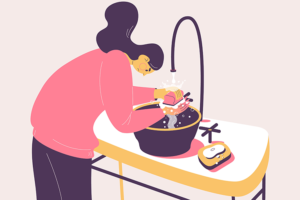By NAMI Southwest Washington
As someone who often finds themselves grappling with mental health challenges during the holiday season, I understand the paradox that these times present. The world is aglow with festive lights, the air filled with the scent of holiday treats, and everywhere we turn, there’s an emphasis on joy, gratitude, and togetherness. Yet, for many of us, this period brings a contrasting experience, marked by loneliness, stress, and a deep sense of disconnection.
The constant reminders of happiness and unity can amplify feelings of loneliness, making the absence of these emotions more profound. The stress of the season, from financial pressures to the demands of social engagements, can be overwhelming, creating a sense of anxiety rather than peace. Additionally, amidst the bustling crowds and busy schedules, a deep sense of disconnection can emerge, isolating us in a sea of supposed merriment. This dichotomy between the external world’s festive cheer and our internal struggles creates a complex emotional landscape that can be difficult to navigate, often leaving us feeling like outsiders during a time meant for inclusion and celebration.
The Holiday Blues: More Common Than You Think
It’s important to acknowledge that feeling down during the holidays isn’t unusual. We are constantly bombarded with images of perfect families and festive gatherings, creating an unrealistic benchmark for happiness. This societal portrayal can intensify feelings of inadequacy or loneliness, especially if our reality doesn’t align with these idealized visions.
Moreover, the holiday season can resurrect old memories and reignite grief or loss. The pressure to be merry can exacerbate existing mental health issues, making it a challenging time for many.
My Personal Journey: Coping Strategies That Work for Me
Through my own struggles, I’ve learned a few strategies that help me maintain a semblance of balance during these times:
1. Setting Realistic Expectations: I remind myself that it’s okay not to have a picture-perfect holiday. Accepting that my experience of the season might differ from others’ and from societal expectations helps alleviate the pressure to feel a certain way.
2. Prioritizing Self-Care: This includes ensuring I get enough rest, eat nourishing food, and engage in activities that bring me joy, whether it’s reading a good book or taking a quiet walk. Self-care is not selfish; it’s essential.
3. Seeking Connection: I try to connect with people who understand and respect my feelings. Sometimes, a simple conversation with a friend who gets it can be incredibly comforting.
4. Limiting Social Media: Reducing my exposure to the often unrealistic portrayals of the holidays on social media helps. It’s easy to fall into the comparison trap, so I consciously limit my screen time.
5. Embracing Small Joys: I focus on small things that bring me happiness — the aroma of a favorite holiday treat, the beauty of winter’s first snow, or the warmth of a cozy blanket.
6. Professional Support: I am not hesitant to reach out to a therapist or counselor when things get overwhelming. There’s no shame in seeking professional help.
A Message of Solidarity
If you’re struggling this holiday season, know that you’re not alone. It’s okay to feel how you feel, and it’s okay to prioritize your mental health. Remember, the essence of the holiday season is not about perfection but about finding moments of peace and joy, however small they may be.
As we navigate these contrasting emotions, let’s be kind to ourselves and remember that it’s okay to step back, breathe, and take care of our mental wellbeing. After all, the greatest gift we can give ourselves is the permission to experience the holidays in a way that’s true to us.




